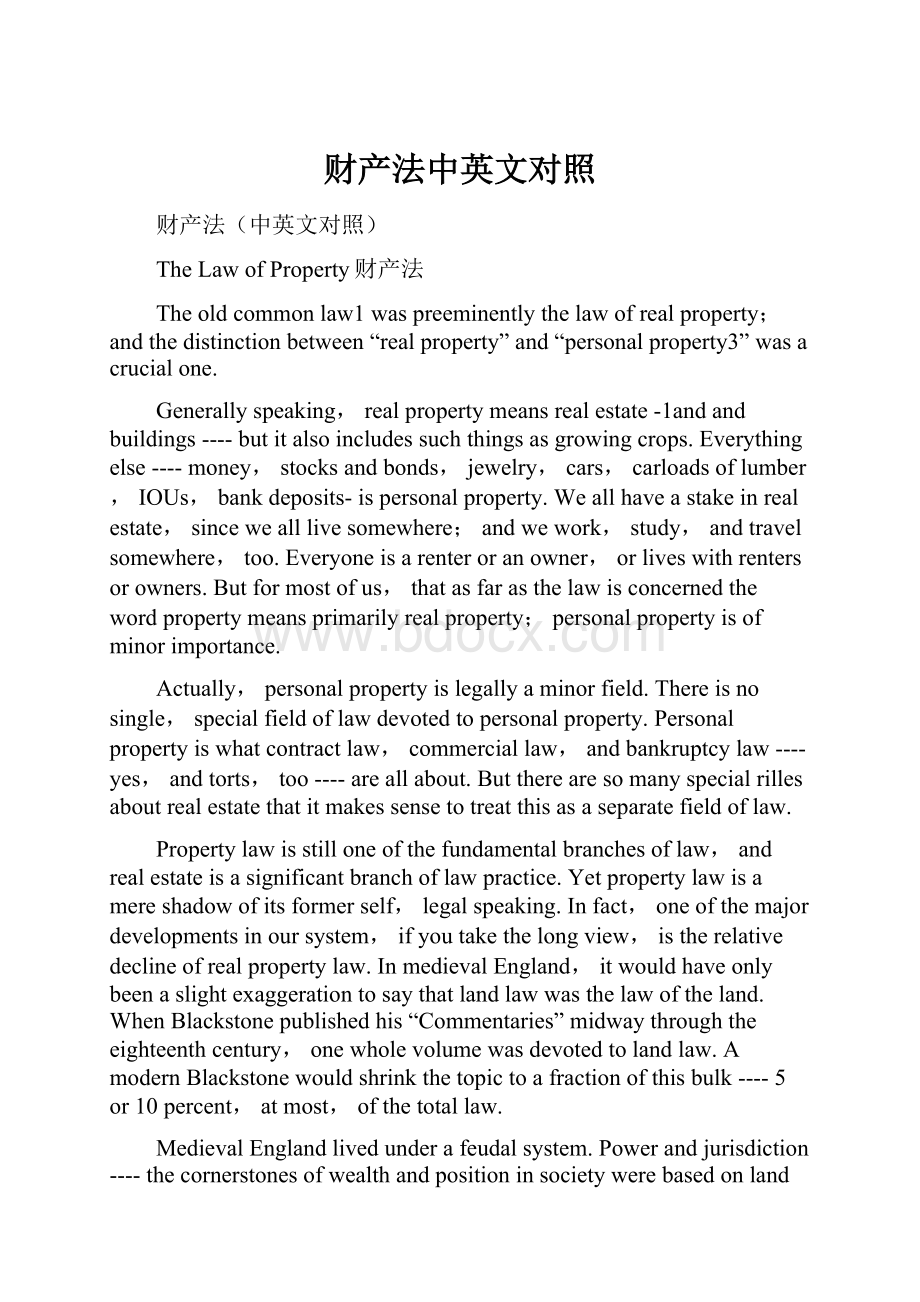财产法中英文对照.docx
《财产法中英文对照.docx》由会员分享,可在线阅读,更多相关《财产法中英文对照.docx(5页珍藏版)》请在冰豆网上搜索。

财产法中英文对照
财产法(中英文对照)
TheLawofProperty财产法
Theoldcommonlaw1waspreeminentlythelawofrealproperty;andthedistinctionbetween“realproperty”and“personalproperty3”wasacrucialone.
Generallyspeaking,realpropertymeansrealestate-1andandbuildings----butitalsoincludessuchthingsasgrowingcrops.Everythingelse----money,stocksandbonds,jewelry,cars,carloadsoflumber,IOUs,bankdeposits-ispersonalproperty.Weallhaveastakeinrealestate,sincewealllivesomewhere;andwework,study,andtravelsomewhere,too.Everyoneisarenteroranowner,orliveswithrentersorowners.Butformostofus,thatasfarasthelawisconcernedthewordpropertymeansprimarilyrealproperty;personalpropertyisofminorimportance.
Actually,personalpropertyislegallyaminorfield.Thereisnosingle,specialfieldoflawdevotedtopersonalproperty.Personalpropertyiswhatcontractlaw,commerciallaw,andbankruptcylaw----yes,andtorts,too----areallabout.Buttherearesomanyspecialrillesaboutrealestatethatitmakessensetotreatthisasaseparatefieldoflaw.
Propertylawisstilloneofthefundamentalbranchesoflaw,andrealestateisasignificantbranchoflawpractice.Yetpropertylawisamereshadowofitsformerself,legalspeaking.Infact,oneofthemajordevelopmentsinoursystem,ifyoutakethelongview,istherelativedeclineofrealpropertylaw.InmedievalEngland,itwouldhaveonlybeenaslightexaggerationtosaythatlandlawwasthelawoftheland.WhenBlackstonepublishedhis“Commentaries”midwaythroughtheeighteenthcentury,onewholevolumewasdevotedtolandlaw.AmodernBlackstonewouldshrinkthetopictoafractionofthisbulk----5or10percent,atmost,ofthetotallaw.
MedievalEnglandlivedunderafeudalsystem.Powerandjurisdiction----thecornerstonesofwealthandpositioninsocietywerebasedonlandandlandalone.The“lord”wasapersonwhoheldanestate----apersonwithownership,mastery,controloverland.Apersonwithoutlandwasapersonwithnorealstakeinaffairsofstate.Thecommonlaw,astheroyallawcourtsexpoundedithadlittletosaytomenandwomenwithoutland,whowerethemajorityoftheEnglishpopulation.InAmerica,atonetime,onlypersonswhohadinterestsinlandwereentitledtovoteorholdoffice.TheNewYorkconstitutionof1777,forexample,restrictedtherighttovoteforstatesenatorstomenwhoowned“freeholds”with$100ormore,freeandclearofdebt(ArticleX)allthis,ofcourse,hasended;landisonlyoneformofwealth.Agreatandpowerfulfamilyisonethatcontrolsmightyenterprises,ratherthanonethatrulesvastestates.
Propertylawstillcoversarichandvariedgroupofsubject.Tobeginwith,itasks.Whatdoesitmeanto“own”land?
HowcanIgettitletolandandhowcanIdisposeofitlegally?
Thereareissuesaboutdeeds,jointownership,andlandrecordsandregistration;andproblemsoflandfinance,includingrulesaboutmortgagesandforeclosures.Thereisthelawof“nuisance”,whichrestrictsmefromusingmylandinsuchawayastohurtmyneighbors,pouringsmokeorsendingbadsmellsontohisland,forexample.Therearethelawof“easements”andtheexoticlawof“covenants”(especiallythosethat“runwiththeland”):
thesedealwithrightsapersonmighthaveinhisneighbor'sland----rightstodriveacaruphisdriveway,towalkacrosshislawn,ortokeephimfromtakinginboarders.Thesearenotrightsofownership;rathertheyare“servitudes”----restrictionsorexceptionstotheowner'srights,infavorofthoseanother.
Thecommonlawwasingeniousincarvinguprightstolandintovariouscomplexsegmentscalled“estates”。
Thesecouldbeeithertimesegmentsorspacesegments.A“lifeestate”(myrighttoliveinacertainhouse,forexample,untilIdie),isatimesegment;soisathree-yearleaseofafarmorapartmenthouse.Spacesegmentsincludeairrights(therighttobuildontopofcertainproperty)andmineralrights(therighttodigunderneathit)。
Nowadays,thecondominiumisalsopopular;Icanownasliceofsomebuildingthirtystoriesabovetheground.Thecommonlawwasalsoquiteingeniousindevisingformsofcommonorjointownership,withsubtletechnicaldifferencesbetweenthem.
Therearealsoallsortsof“futureinterests”knowntothecommonlaw.SupposeIleavemyhousetomysisterforlife,andthentoanyofherchildrenwhomightbealivewhenshedies.Thechildrenhaveafutureinterest;thatis,thetimetheywillgetthehouseispostponedtosomefar-offdate.Butthefutureeventiscertaintohappen,andthusthefutureinterestcanhavevalueandrealitynow,whilemysisterisverymuchalive.Thelawoffutureinterestsdevelopedinamostgnarledandcomplicatedway.Itsintricaciesdrovegenerationsoflawstudentstodespair.
Anotherimportant,fairlynew,branchofpropertylawisthelawof“landusecontrols”。
Itdealswiththelimitimposedonwhatpeoplecandowiththeirproperty.Thiswasanissueinthelawofnuisance,butmoderncontrolsgofarbeyondthis.Zoningisafamiliartypeoflanduserestriction.ZoningordinancesdatefromaboutthetimeoftheFirstWorldWar;theyarenowalmostuniversalincitiesandvillages.Zoningordinancesdividetownsintozonesdesignatedfordifferentuses.Ifmyneighborhoodis“zoned”residential,Icannotbuildafactoryorrunarestaurantonmyproperty.Ifthezoneisrestrictedtosingle-familydwellings,Icannotevenrunaroominghouseorrentoutapartments.
译文
旧的英美法最杰出的部分是对不动产的规定,而且其关键是区别了不动产与动产。
总的说来,不动产是指房地产----土地和建筑物,但它也包括诸如正在生长的农作物之类的东西。
其余的东西----金钱、股票和债券、珠宝、汽车、货车所载的木材、借据、银行存款----是动产。
在房产方面我们有共同利益,因为我们都住在某个地方,我们也在某地工作、学习和旅游。
每个人都是出租人或所有人,或与出租人、所有人住在一起。
但是对我们大多数人来说,动产和不动产是两回事。
虽然看上去有点怪,但就法律而言,单词“财产”主要是指不动产,动产是次要的。
确实,动产在法律上是次要的领域。
没有一个单一的、专门的部门法是专用于动产的。
动产是合同法、商法和破产法还有侵权法等涉及到的问题。
但是关于不动产却有很多专门的法规,所以完全可以把它看作一个单独的法律领域。
财产法仍然是基本的部门法之一,而不动产是法律实务的一个重要分支。
从法律上讲,财产法仅是其前身的翻版。
事实上,如果从长远看,我们的法律制度的主要发展之一就是不动产法的相对衰落。
在中世纪的英国,将土地法称为土地的法律也只是稍微有点夸张。
当布莱克斯通在18世纪中叶发表他的《英格兰法释义》时,其中整整一卷是阐述土地法的。
现代版的布莱克斯通《英格兰法释义》将此内容压缩至一小部分,最多占整个法律的5%或10%。
中世纪的英国生活在封建制度下,权力与司法权----这个显示社会财富和地位的标志是完全建立在拥有土地之上的。
“封建领主”是拥有地产的人,他拥有土地的所有权、处分权和控制权。
没有土地的人在国家事务中也没有真正的相关利益。
在英美法中,正如皇室法院所阐述的,没有土地的男人和女人是没有发言权的,而这些人占了英国人口的绝大多数。
在美国,曾经有一段时间,只有对土地有相关利益的人才有资格选举或任公职。
如1777年的纽约宪法规定拥有100美元以上的不动产、没有债务的人才有资格当选为州参议员(第10条)。
当然,所有这些已经结束。
土地只是财富的一种形式。
富有的家族是那些控制大企业。
的,而不是控制大量地产的家族。
财产法还涵盖了一组丰富而不同的主题。
开始讨论之前,先问几个问题:
“拥有”土地指什么?
如何能获得土地的所有权以及如何合法地处分它?
有些问题是关于契约、共同所有权、土地档案和注册,以及土地金融问题的,包括抵押和取消抵押品赎回权规则。
“妨害行为”法限制所有权人用下列方法使用他的土地,如伤害他的邻居、将烟雾或难闻的气味喷放到他人的土地上。
有规定“在他人土地上的通行权”法和外国的“契约”法(尤其是那些经营土地的):
这些法规规定人们在邻居土地上可能有的权利----开车驶过他的车道、穿越他的草坪或阻止他接收寄宿人的权利。
这些不是所有权,而是地役权----有利于他人对所有人权利的限制或例外。
英美法将土地权巧妙地分割成多个复杂的所谓“地产”的部分。
这些可以是时间部分或空间部分。
“终身地产”(如我住在某间房子直到我死的权利)是一个时间部分,对农场或公寓的三年出租也是时间部分。
空间部分包括空间所有权(在某个财产之上造房子的权利)和采矿权(在地下挖掘的权利)。
目前,共同拥有也是很流行的,我可以拥有30层楼的部分房屋。
英美法在设计公共或共有所有权的形式上是非常灵活的,两者间在法律意义上有微妙的差异。
对于英美法还有各种众所周知的“未来权益”。
假如我将我的房子终身留给我妹妹,然后她死后留给她活着的任何孩子。
孩子们有未来权益,也就是说,他们得到房子的时间将被推迟到某个遥远的日期。
但是未来的事件是肯定要发生的,因而未来权益现在是有价值并且现实的,虽然我妹妹还活着。
未来权益法的发展形式多样、错综复杂。
它的纷繁难懂曾使几代法学院学生绝望。
财产法的另一个重要而又非常新的分支是“土地使用控制”法。
它应对的是强行限制人们处置其财产的权利。
这是一个“妨害行为”法的问题,但现代的控制已远远超过了这些,区域划定是人人皆知的土地使用限制的类型。
区域划定法令起源于第一次世界大战,如今几乎在城市和乡村普遍使用。
区域划定法令将城镇划分为确定不同用途的地区。
如果我的街坊是被划定为居民区,我就不能在我的财产上建造工厂或开饭店。
如果这个区域限定为家庭居住区,我甚至不能经营旅馆或出租公寓。